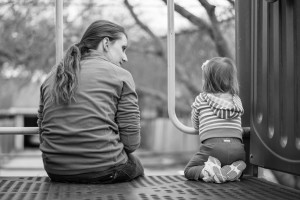 A Tale of Two New Moms
A Tale of Two New Moms
I’ve been thinking recently about two types of moms I encounter in my work as a parent educator and parent coach. The first is well-aware that she has been lucky in life. She has been raised by loving, supportive (though, of course, imperfect) parents who continue to support her as she herself becomes a parent. When she becomes a mom though, she is still shocked by how hard it is and how challenging the needs of her newborn can feel.
The second mom had a harder start in life than the first. She was raised by parents who were not emotionally available or perhaps even abusive. She has limited ties with her family of origin and has worked hard to build a good life for herself. When she becomes a parent she has little practical support and feels overwhelmed by the adjustment to becoming a mom. She really wants to be a good parent to her child but isn’t sure what that attachment should look or feel like because she didn’t get it herself as a child. She is parenting without a roadmap. She has a vision for how she wants it to feel to be a good parent, but without any idea of how to get there.
What can we learn from these two scenarios? First, that being a parent is just plain hard for almost everyone! Second, that our backgrounds directly influence our own ability to parent with confidence and presence. Research shows us that attachment between parent and child is strongest when parents have the capacity to be reflective both about their current emotional states and about their own past. Parents who make the decision to do their own emotional work—taking stock of what their own childhood relationships were like and what kind of effect they had on the adult they’ve become—are more likely to be emotionally aware and present in their relationships with their own children.
The desire to connect with our children, to see them and love them as they are while providing boundaries and security, is almost universal. Here are some ideas about how to build your roadmap for the relationship you want to have with your kids.
Find Role Models
Spend some time thinking about the qualities you most want to pass on to your children and what kind of values you must inhabit in order for this to happen. You can think back to your own childhood and what your parents did and did not do well. What traditions and ways of being from your own childhood do you want to pass on, and which do you want to leave behind?
It is also important to realize that you can find role models all around you. Who were the people who helped and nurtured you as a child and as an adult? What qualities did they have? You can look to your parenting peers and notice what they do well and how they do it. This is not meant as a comparison but as a way to help you to learn new parenting skills.
These role models do not even have to be people you know. Many parents look to historical or contemporary figures for parenting inspiration. It is really the noticing and attempt at integrating these qualities into your own life that matter most. I know one young mother who is purposefully modeling her parenting on the loving firmness of that famous TV mom, Claire Huxtable!
Part 2 can be found here.
Want to put some of these ideas into practice. Check out Erin’s Listening Mothers class series.
 By Erin Bernau
By Erin Bernau
Erin B. Bernau, MSW, LICSW works as a parent coach with GROW Parenting and as a parent educator at Seattle Central College’s Parent/Child Center. She has lived in California and on the East Coast, but loves raising her own family in Seattle.
Feature image by Donnie Ray Jones.



